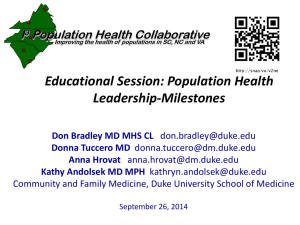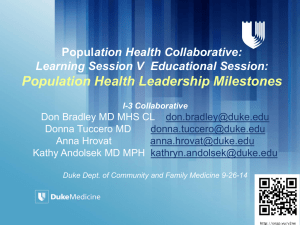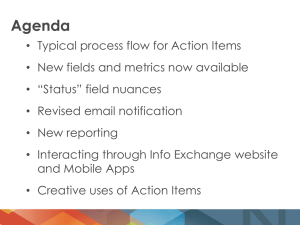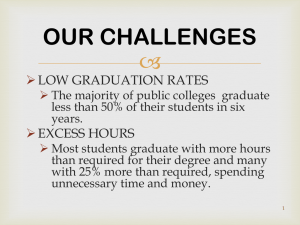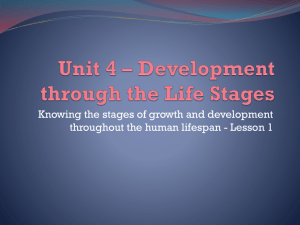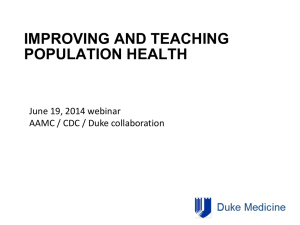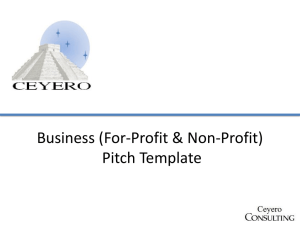Fullerton Foundation Sponsored Population Health Improvement
advertisement
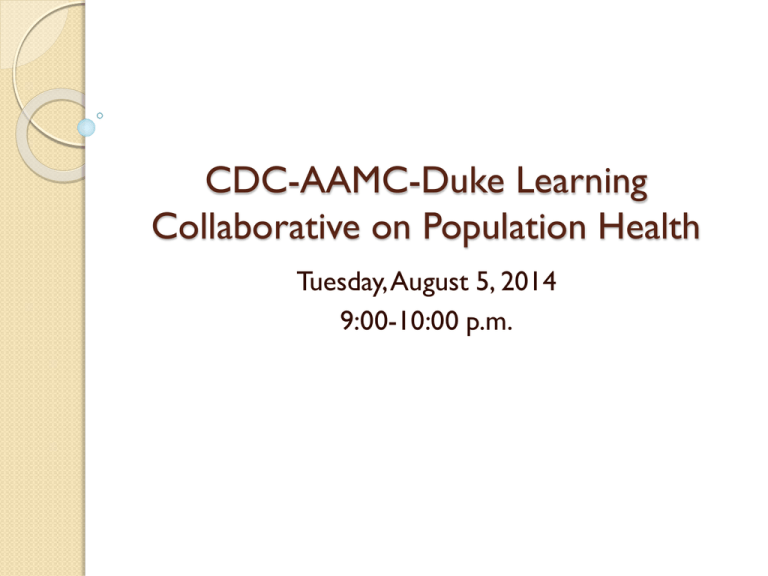
CDC-AAMC-Duke Learning Collaborative on Population Health Tuesday, August 5, 2014 9:00-10:00 p.m. AGENDA Milestones and population health, Kathryn Andolsek, 20 minutes ◦ Population health content across specialties ◦ Generic population health milestones “Pre-packaged” curricula, Mina Silberberg, Sarah Weaver, Gwen Murphy, and Morgan Passiment, 20 minutes Discussion of collaboration and dissemination methods going forward, Lloyd Michener, 15 minutes Next webinar. Lloyd, 5 minutes MILESTONES AND POPULATION HEALTH Population Health Milestones Across Specialties A review of milestones for 40 specialties/subspecialties found population health content within the milestones of all 40. Some disciplines having milestones with population health content in more than a dozen sub-competencies. Population Health Content in Milestones– Example from Family Medicine Population Health Content in Milestones– Example from Plastic Surgery Generic Milestones Generic milestones across the four population health competency domains Different specialties will aspire to different levels Process ◦ Begun at conference of Society of Teachers of Family Medicine ◦ Currently revising ◦ Review at I3 Collaborative Face-to-Face meeting this fall ◦ Volunteers needed to review, provide feedback. Anybody interested? The I3 Population Health Collaborative is a learning collaborative of academic primary care programs in North Carolina, South Carolina and Virginia. Its mission is to create momentum for widespread ambulatory practice improvement “Pre-packaged” Curricula The AAMC’s 6-Module Curriculum The Duke GME Population Health Innovation Modules Modified Duke Family Medicine Population Health Improvement Teamwork Curriculum Curricula based on identifying recommended materials to match generic milestones and primary care milestones(in process) AAMC/Duke Learning Modules and Population Health Competencies Six modules including prep time and one-hour inperson sessions – based off of Duke PHIT curriculum Modules Population Health Competency 1. Understanding Community PH-1 Examine the characteristics that bind people together as a community – including social ties, common perspectives and interests, and geography – and how these relate to health PH-2 Address the role of socioeconomic, environmental, culture, and other population-level determinants of health on the health status and health care of individuals and populations 2. Building a Team for a Common Purpose TS-1 Effectively practice as a member of interprofessional health care teams TS-3 Communicate with team members to clarify each person’s responsibility in executing a health intervention 3. Working with Community Resources PH-3 Use community assets and resources to improve health at the individual and population levels CE-5 Participate in population health improvement strategies by using community-based participatory methodologies 4. How to Identify, Assess and Use Data CT-1 Use qualitative and quantitative data to assess the health status of a population CT-4 Assess process and outcomes of interventions 5. Change Management TS-4 Support and manage change in complex environments PH-7 Understand and support he principles of accountability and accreditation at the community or public health agency level 6. Working as a Team to Apply QI Principles CE-2 Analyze the role of community engagement as a strategy for identifying community health concerns, improving health, and reducing health disparities TS-2 Lead interprofessional teams in health improvement CT-3 Apply QI principles in community or public health For more information: Morgan Passiment <mpassiment@aamc.org> GME Population Health Innovation Modules Two grants from the Duke GME Innovation Fund Goal is to cover all of the competencies in the Population Health Competency Map Developed in Qualtrics – allows for data collection Short—15-20 minutes Format ◦ Start with a situation—How would you engage community partners? ◦ A short lesson ◦ Revisiting the initial situation ◦ Take away Available at iCollaborative: https://www.mededportal.org/icollaborative CULTURAL RESPONSIVENESS Warm-Up Imagine you are working in a pediatric practice. An immigrant couple brings in their 18 month-old daughter. You notice that the child is wearing the bracelet above. You are concerned that it may be a choking hazard for the little girl. Please write a brief paragraph explaining what you may say to, or ask, the parents about this issue. Next Screen Here are two possible answers. Which one is more likely to be effective? Please explain your answer in a few sentences. Answer 1: ◦ I’m concerned that that bracelet might be a choking hazard. It could come loose as she chews on it and cause her to choke. You should remove it. She should not wear a bracelet or other jewelry until she is at least 3 years old. Answer 2: ◦ You: That’s a beautiful bracelet. Can you tell me more about it? Does it mean something special? ◦ Mother: It is an amulet to protect her from the evil eye. ◦ You: I understand. Does she ever play with it or chew on it? ◦ Mother: Sometimes. Not often. ◦ You: That’s good. I’m a little worried that, because she is so little, she might chew on the bracelet and that if it came loose she could choke. To keep her safe, could you check the bracelet every day to make sure the catch and charm are secure, and encourage her to keep it out of her mouth? The exercise continues with a short reading about cultural responsiveness and two additional scenarios in which learners are asked to write culturally responsive solutions. The module concludes with a brief reading about the role of Motivational Interviewing in culturally responsive health care, and additional resources for the learner to explore. Modified Duke Family Medicine PHIT Curriculum Presented previously. Attempts to combine didactic, reflective, and experiential learning. Has evolved over years. Will be available at iCollaborative: https://www.mededportal.org/icollaborative MOVING FORWARD WITH DISSEMINATION AND SHARING Next Steps Possible merger with Fullerton group Listserve Other approaches? UPCOMING WEBINAR TOPICS? Next webinar scheduled for: September 9th Tuesday 10am EST repeated September 16th Tuesday 3pm EST
